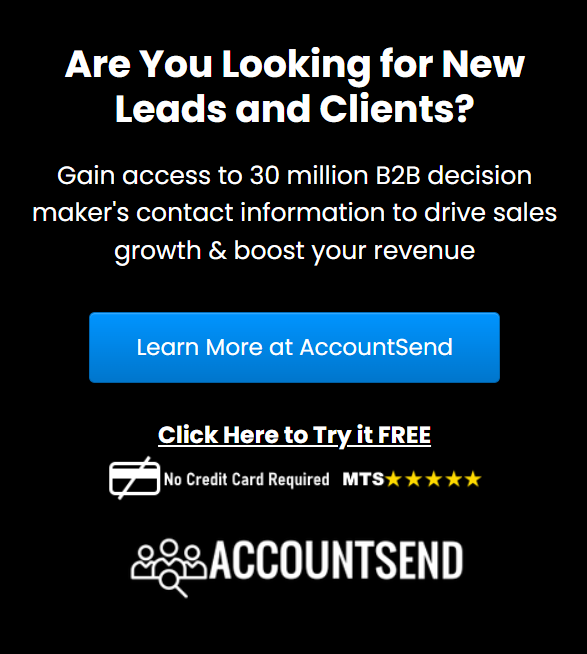The Insider's Guide to Buying Sales Leads: What You Need to Know
Article by Jonathan Bomser | CEO | AccountSend.com

DOWNLOAD THE INSIDER'S GUIDE INFOGRAPHIC HERE
Know Your Sales Goals and Target Audience
Before purchasing sales leads, it's crucial to have a clear understanding of your sales goals and target audience. Define your ideal customer profile, including demographics, industry, job titles, and pain points. Determine your specific sales objectives, whether it's increasing market share, expanding into new territories, or launching a new product. This knowledge will guide your selection process and ensure you acquire leads that align with your business objectives.
Understand Different Types of Sales Leads
Sales leads come in various forms, and it's essential to understand the differences. MQLs (Marketing Qualified Leads) are prospects who have shown interest in your offerings but may not be ready to make a purchase. SQLs (Sales Qualified Leads) are prospects who have been qualified as potential customers and are further along the sales pipeline. Each type of lead serves a specific purpose in your sales process, so determine which type aligns with your objectives and sales cycle.
Evaluate Lead Quality and Source
When buying sales leads, quality is paramount. Not all leads are created equal, so it's crucial to evaluate the quality and source of the leads before making a purchase. Look for reputable lead providers with a track record of delivering high-quality leads. Assess the lead generation methods used by the provider to ensure they align with ethical and compliant practices. Scrutinize lead attributes such as accuracy, relevance, and exclusivity to ensure you receive leads that have a higher probability of conversion.
Consider Lead Verification and Freshness
Lead verification and freshness are crucial factors in determining lead quality. Verify whether the leads have been validated and verified for accuracy and legitimacy. Outdated or stale leads can waste your time and resources, so inquire about the lead provider's processes for ensuring lead freshness. Fresh and verified leads will have a higher chance of engagement and conversion, maximizing your sales efforts.

Maximize ROI through Lead Nurturing and Follow-up
Buying sales leads is just the beginning of your sales journey. To maximize your return on investment, focus on lead nurturing and follow-up. Develop a strategic lead nurturing process to engage and build relationships with your acquired leads. Implement personalized and targeted follow-up campaigns that address the specific needs and pain points of your leads. The key is to provide value, establish trust, and guide leads through the buyer's journey, ultimately increasing your conversion rates and ROI.
Track and Analyze Lead Performance
To assess the effectiveness of your purchased leads, track and analyze their performance. Monitor key metrics such as conversion rates, customer acquisition costs, and customer lifetime value. Identify which lead sources, campaigns, or segments are driving the best results. Continuously optimize your lead generation strategy based on data insights, ensuring you allocate your resources to the most successful lead sources.
Buying sales leads can be a strategic move to accelerate your sales and business growth. By knowing your sales goals and target audience, understanding different types of leads, evaluating lead quality and source, considering lead verification and freshness, maximizing ROI through lead nurturing and follow-up, and tracking and analyzing lead performance, you can make informed decisions and leverage purchased leads effectively. Armed with this insider's guide, you are now equipped to navigate the sales lead market with confidence and unlock the potential of purchased leads to drive your business forward.
SALES AND BUSINESS DEVELOPMENT
10 ways to Say goodbye to stagnant sales with these powerful tactics
From Snooze to Sales-palooza: Unleash Your Sales and Lead Generation Superpowers!
Transform your sales game with these insider tips
How can AccountSend.com increase your sales, lead generation and business development efforts?
Accelerate your business growth with these insider secrets
10 ways to grow your business using AccountSend.com B2B decision maker data
Don't miss out on these game-changing sales tactics
Unleashing Your Sales Potential: Exploring Targeted Lead Generation
Navigating Tough Times: 10 Strategies to Boost Sales When The Going Gets Rough
LEAD GENERATION
Crack the Code and Unleash Success: The Ultimate Guide to B2B Lead Generation Success and Magic!
Ignite Your Growth: Unleash the Power of Lead Generation to Skyrocket Your Client Base!
Boost your bottom line with these lead generation strategies
Unleash the Power of Lead Generation: 10 Proven Formulas That Deliver Results
B2B CONTACT DATABASE
How to Build an Effective B2B Contact Database
The Benefits of Using a B2B Contact Database for Sales and Marketing
Effective strategies to gain new clients using database lists from AccountSend.com
How to Measure the Success of Your B2B Contact Database
INDUSTRIES INFORMATION

